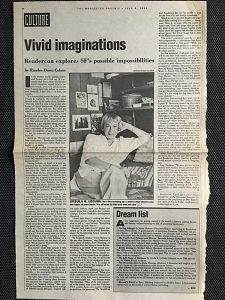7.08.17 Flashback! Ellen Kushner and Delia Sherman talk Readercon (1994): ‘It’s like Brigadoon!’
In 1994, I had my first brush with science fiction/fantasy conventions when The Boston Phoenix asked me to interview Ursula K. LeGuin, who was to be the Guest of Honor (along with Terri Windling) at the 7th annual Readercon. At that time, I still had an image in my head that SFF conventions were all Spock ears and geekery — I didn’t know there was a whole other side to fandom, or that geekery would one day be my way of life, or that one day I’d be on panels and reading at Readercon myself. In order to flesh out the article with expert opinions from other writers who had attended Readercon, I was given contact info for Ellen Kushner and Delia Sherman — with whom I was even less acquainted than LeGuin. As I have said before: I was not worthy!
Fortunately, the ladies (who wed when it wasn’t “legal” in 1996 and then officially in 2004) turned out to be wonderful and gracious and models of how I hope I might be if some neophyte showed up with a press pass to ask dumb questions. By the time we sat down to speak I was in the middle of Sherman’s The Porcelain Dove, which was wonderful, but it would take a little longer before I tackled Kushner’s Swordspoint and Thomas the Rhymer books. Today, they are among my amazing writer friends — supportive of my work, and I even do some assistant work for Kushner as needed. But being in their circle has utterly changed my relationship to publishing, whether or not one of my own books ever sees print: they are open and welcoming and inclusive and exactly what you would want them to be. Plus, they have an amazing NYC apartment!
That said, for this chat we met in Boston. For years I would tell the tale as us meeting at Newbury Books and sitting outdoors to chat, but here’s the fact about memory: it is unreliable. My notes say we actually met up at the Harvard Bookstore Cafe for this chat. Here’s the transcript, in which they are wonderful and I am treading water. To read the Usula K. LeGuin transcript, which was conducted over the phone, simply go here.
From my notes: “Ellen is about 38 and looks 30; Delia just turned 43 and looks incredibly elegant. Ellen speaks like a New Yorker, and is eager to sell the whole conference.” (I had to differentiate their voices for transcribing later, which is why I bothered describing Ellen’s voice at all.)
So please tell me: what is Readercon like? What happens there?
Ellen Kushner: It starts with an icebreaker, in something called Meet the Author. Everyone writes up a sentence and gets it printed out on stickies. Then you go around the room and get other people’s sentences. Some people make up stories.
Delia Sherman: People decorate themselves with sentences; put them all over themselves. What is actually very neat is having someone show you their sentence collection and trying to guess who wrote what.
EK: You can go off with your friends and sit in the bar, but that’s not what it’s all really about. What’s more important is to have a place to go to talk with someone who’s read your book. And that is so unique to SFF, because of these conventions. When your job is to sit in your room and write, the opportunity to meet people who have actually read your writing, it’s fantastic! It’s not that they have to come up and worship you, although that’s nice, but they actually know what you’ve done! And they can argue with you or whatever.
DS: We are in contact with our public more than just about any other type of fiction writer. Romance writers — their fans feel strongly about them but they don’t really know them, because is such an image-driven industry. Most people aren’t using their own names. But with us, you get this feedback and you get a notion of your audience like no one else does.
EK: Which is good and bad. Some can be remarkably obnoxious, because you’re a public person, so they can tell you what’s wrong with your book. There’s always been this soft line between those who read and those who write in science fiction and fantasy.
DS: And a lot of the people who are reading now will be the ones who write next week.
EK: It is really social, writers go not to just interact with readers but to interact with each other. Fans go to interact with other people who like what they like. And what a lot of the outside public doesn’t realize is just how many different leaves there are to each book, socially. There are those people who want to wear the Spock ears, and the funny T-shirts with the slogans on them, and there are people want to be writers and people who want to be editors, and there are people who read all the time … and at each convention all of those layers are there. What the media tends to pick up visually is the weirdest looking stuff because it’s the most obvious.
DS: Also the large commercial conventions that thousands of people go to are heavily populated by media fans who never actually pick up a book. What makes Readercon different is that it is really about reading, there aren’t any jewelry booths in the sales room.
EK: Many of the best-known conventions are commercially run. Most of the ones connected to the media, with a real Star Trek/Star Wars gaming comics bent are money-making propositions for a private person. Whereas WorldCon and Readercon are — the level of work people put in this not for profit, just for the love of it, is remarkable. And Readercon is special in that — yeah, the science fiction world of fans has become specialized — some people read books, some people don’t — it’s seen as a fringe, marginalized set of people, and Readercon tries not to marginalize the literature.
Does writing fantasy come with a stigma? That it isn’t taken seriously, like other “literature”?
EK: In the fantasy field you are trapped in the genre ghetto, but there is an automatic readership, there’s a huge amount of interest, there are more magazines that review f/sf, who check what has come out, you can make a life for yourself in that field.
DS: But it is getting harder and harder to keep that readership because there are so many books that come out. So the ideal thing is to get it published as a mainstream book — a lot of people like the mixture of realistic and magic, it gives you the best of both worlds.
EK: One of my good friends now is a senior partner in a law firm, and the way I got to know him is I mentioned I wrote fantasy, expecting to have to do my usual, “But mine’s very literary, it’s not like that junk you think,” and his eyes just lit up and he turns to read the good stuff, he reads [Ursula K.] LeGuin, he read it to his kids. And suddenly, there are more people like that than you think. They’re not at the conventions necessarily. None of us expect it. And yeah, we do figure that the people with the big pins on are fans, but it’s not always true. And when I meet people like that I will also say to them, “You should come to Readercon” and they say, “I don’t want to go where there’s Spock Ears” and I’ll say, “No, it’s all people like you.” It’s like coming out!
What are some of the highlights of the con?
DS: There are real arguments and discussions coming from the audience, and it’s really quite stimulating. It’s like being in a big class of really feisty students.
EK: It’s almost like a cafe, a European cafe where everyone is sitting around scribbling on napkins. Readercon is a strange bohemian neighborhood.
DS: A very strange bohemian neighborhood.
EK: And you’re talking about ideas all weekend! And that’s so great.
DS: Which is unusual these days — not too many people talk about ideas that much any more.
EK: People don’t really believe in fairies these days any more —
DS: But they would really like to or we’d be out of business. We live in a society which is so secularized and that leaves us with so little to believe in that you either get people who deify technology which is where you get science fiction and the real technocrats full of gadgets or you get people who won’t — there are a lot of books written about God and the gods or man’s relationship with god that is very difficult to do in mainstream fiction. If you’re interested in that type of philosophy, fantasy and science fiction give you the only forum in which to discuss it — the metaphors are easier to come by, the metaphors are closer to the surface. It’s really one of the last bastions of plot-driven narrative. Genre fiction — westerns, mystery — anything that isn’t mainstream literary fiction has to have a story. People who read it will not sit still for a story about people staring at umbrellas, having deep thoughts.
EK: All science fiction is not Star Wars and not all fantasy is Beauty and the Beast. Not all science fiction is techy and without character — and fantasy, which was part of the mainstream in the 19th and early 20th century, wasn’t really genrefied until the success of [J.R.R.] Tolkien. Victor Hugo wrote Les Miserables and fantasy and was revered for both.
So if you had to come up with a slogan for Readercon, what would you say?
EK: It’s like a floating village, and everyone keeps coming back. It’s like Brigadoon.
See you at Readercon! Here’s my schedule — stop by and say hello!
xo,
R
Like what you’re reading? Donate here!


Very cool interview! Even though I’m not a fantasy person, per se, I really enjoyed it.